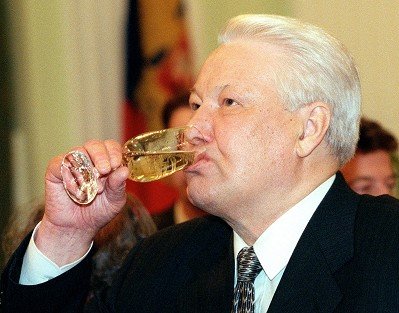Posted on March
11, 2024
Sorry, Dahlink
If Budapest is toothless, then so is
Article 5
by
Daniel
Clark
In a March 1st posting on the National Review blog
"The Corner," Michael Brendan Dougherty set his sights on an easy target in
retiring senator Mitt Romney, but misfired.
In response to a recent interview the former presidential candidate gave
to CNN, Dougherty wrote, "First problem is that [Romney] mischaracterizes the
Budapest memorandum as pledging us 'to help defend the people of Ukraine.' It does no such thing, and it cannot be
construed that way."
Okay, so the memorandum makes no mention of "the
people of Ukraine." What it does say is
that its signatories (the United States, Great Britain and Russia) "reaffirm
their commitment ... to respect the independence and sovereignty and the existing
borders of Ukraine," and that they "reaffirm their obligation to refrain from
the threat or use of force against the territorial integrity or political
independence of Ukraine." Romney
understands this (or construes it, if you will) to amount to a defense
of the Ukrainian people. How reasonable
is it to draw a semantic distinction, as Dougherty does, such that a
multilateral agreement to respect a nation's sovereignty and political
independence is not essentially a defense of its people?
 As
long as Dougherty insists on parsing words, it must be pointed out that there
is a difference between a pledge and a commitment. A pledge is a binding promise. When Dougherty says that the Budapest
Memorandum "does not pledge military aid," he is correct, because the document
does not spell out what must be done in the event of a violation. Romney did not use the word "pledge," though. What he said was that failure to support
Ukraine "will make it very clear to people around the world that you really
can't trust America's word, because we made a commitment in 1994 to respect the
sovereignty of Ukraine, to help defend the people of Ukraine if they were
attacked." In fact, the commitment of
all three nations to respect Ukrainian sovereignty is right there in the
document.
As
long as Dougherty insists on parsing words, it must be pointed out that there
is a difference between a pledge and a commitment. A pledge is a binding promise. When Dougherty says that the Budapest
Memorandum "does not pledge military aid," he is correct, because the document
does not spell out what must be done in the event of a violation. Romney did not use the word "pledge," though. What he said was that failure to support
Ukraine "will make it very clear to people around the world that you really
can't trust America's word, because we made a commitment in 1994 to respect the
sovereignty of Ukraine, to help defend the people of Ukraine if they were
attacked." In fact, the commitment of
all three nations to respect Ukrainian sovereignty is right there in the
document.
The Budapest Memorandum is not a treaty. It is an agreement that was signed by
President Bill Clinton, Prime Minister John Major and President Boris Yeltsin,
to persuade Ukraine to turn its Soviet-era nuclear weapons over to Russia,
presumably to be destroyed. Ukraine
understood that Russia had designs on conquering it, and would never have
trusted a simple promise from its government that it would not invade. The guarantee of security that convinced Ukraine
to give up its nuclear deterrent came from the United States. Nobody ever supposed that there was a need
for the U.S. and Britain to promise not to violate the territorial integrity of
Ukraine. The Ukrainians surrendered
their nukes with the understanding that the Western powers would hold Russia to
the agreement. Admittedly, the deal does
not contain a "pledge" of military aid, but our commitment could hardly be more
clear.
 In
the absence of a mechanism to compel us to honor that commitment, opponents of
aid to Ukraine are taking the Animal House approach, telling the
Ukrainians in so many words that they screwed up. They trusted us. In addition to the basic immorality of that,
it would obviously become a negative factor in any negotiation our country has
with any other country in the foreseeable future. Certainly any similar attempt to contain
nuclear proliferation would be a nonstarter, after we had created the very
outcome that the Budapest Memorandum was designed to prevent. Not only that, but doubts would be cast over
all of our already existing international commitments, including those to our
NATO allies.
In
the absence of a mechanism to compel us to honor that commitment, opponents of
aid to Ukraine are taking the Animal House approach, telling the
Ukrainians in so many words that they screwed up. They trusted us. In addition to the basic immorality of that,
it would obviously become a negative factor in any negotiation our country has
with any other country in the foreseeable future. Certainly any similar attempt to contain
nuclear proliferation would be a nonstarter, after we had created the very
outcome that the Budapest Memorandum was designed to prevent. Not only that, but doubts would be cast over
all of our already existing international commitments, including those to our
NATO allies.
The common understanding of Article 5 of the NATO
Charter is that if Russia were to invade an NATO member state, all other
members of that organization would then be at war with Russia, but that isn't
necessarily the case. What Article 5
says is that in the event that one party is attacked, each of its NATO allies
"will assist the Party or Parties so attacked by taking forthwith, individually
or in concert with the other Parties, such actions as it deems necessary,
including the use of armed force, to restore and maintain the security of the
North Atlantic area." This does not
compel the use of armed force, but only suggests it among those actions a party
may deem necessary. What if we deem it
not to be?
For example, Russia has put Estonian Prime Minister
Kaja Kallas on a wanted list, for her alleged crime of tearing down Soviet-era
monuments. In Estonia, that is. This has been widely dismissed as a symbolic
action, but what if it isn't? The
obvious message behind it is that the Russians believe Estonia is theirs over
which to rule. If Russia were to launch
an operation into Estonia, a NATO country, for the purpose of apprehending
Kallas, how would America respond?
If we read Article 5 the same way Dougherty reads the
Budapest Memorandum and W.C. Fields read the Bible ("looking for loopholes"),
we will notice that it does not mandate military action. Economic sanctions and diplomatic isolation
against Russia are pretty well maxed out, however, which would seem to leave
few non-military options. In our current
political climate, it wouldn't be long before somebody proposed that we "assist"
Estonia by deeming it necessary for it to turn over Kallas for trial in Russia,
in hopes that this concession would end the conflict, thereby restoring the
security of the North Atlantic area.
 That
wouldn't be too different from the advice that self-described realists are now
offering about Ukraine. For that
country's own good, they say, we must encourage it to surrender territory to
Russia, and assume that Russia will be satisfied with that outcome. Part of this encouragement would be the
withholding of aid, which the Ukrainians would only use to prolong their
suffering anyway. In order to save
Ukraine from itself, the argument goes, we must pressure it into accepting
defeat. Of course, such an arrangement
would only buy Russia time to replenish itself until it was prepared to attack
again, but the assumption here is that Ukraine is a goner anyway. "Realism," don't you know. The important thing is that America will have
been extricated from the conflict.
That
wouldn't be too different from the advice that self-described realists are now
offering about Ukraine. For that
country's own good, they say, we must encourage it to surrender territory to
Russia, and assume that Russia will be satisfied with that outcome. Part of this encouragement would be the
withholding of aid, which the Ukrainians would only use to prolong their
suffering anyway. In order to save
Ukraine from itself, the argument goes, we must pressure it into accepting
defeat. Of course, such an arrangement
would only buy Russia time to replenish itself until it was prepared to attack
again, but the assumption here is that Ukraine is a goner anyway. "Realism," don't you know. The important thing is that America will have
been extricated from the conflict.
That's a heck of a message to deliver to our allies
in NATO and around the globe. First, we rally them
to our side with a rousing Prince Hal speech, and then we retire in solitude to
the tavern like Falstaff once the fighting begins. What's worse is what it says to our
adversaries, including Vladimir Putin.
Once he has seen us welch on our commitment to Ukraine, invading a NATO
member like Estonia might strike him as a brilliant tactical maneuver. If America backs down, based on the dubious
assertion that we are not pledged to defend the people of Estonia, the whole
alliance will be exposed as a perfidious fraud.
At this time, it might seem as if Russia lacks the
wherewithal to launch another invasion, but perhaps it just needs to pick its
opponents more carefully. According to
Global Firepower, a think tank that measures the relative military strength of
nations, Ukraine ranks #18 out of 145.
Estonia is #87, Lithuania #88 and Latvia #99. If we help Russia negotiate its way out of
its Ukrainian morass, surely it remains powerful enough to gobble up these far
tinier neighbors, once the inhibition imposed by the NATO alliance has been
lifted. It can always come back for
another bite out of Ukraine when it is through.
Maybe the American political opponents of Ukraine
don't see anything wrong with that.
Maybe the disintegration of NATO is part of what they've been after all
along, which appears to be an abdication of American leadership around the
world. If that's the case, then they
have a responsibility to the American people to make that argument publicly and
be willing to defend it, even if they are not pledged to do so.
The Shinbone: The Frontier of the Free Press